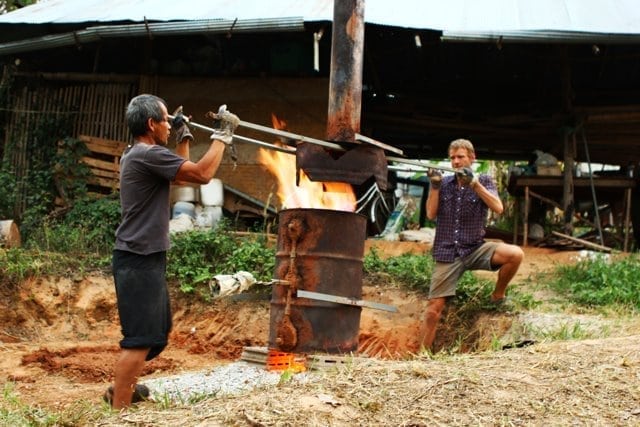As part of a filtration system, biochar is a top-notch and inexpensive means of removing contaminants from drinking water. Biochar can even filter pesticides, making it an attractive solution for farming communities and anyone downstream from the fields. But just how well it removes pesticides has not been well studied.
Biochar, by the way, is the black char made from heating or gasifying wood and other plant material. You can make it yourself, and the leftovers added to garden soil can improve its power to retain water.
Josh Kearns is leading research to evaluate the material. Kearns is the science director at Aqueous Solutions, a non-profit water, sanitation and hygiene development organization, and he has designed and built biochar gasifiers and water filtration systems in communities in Thailand.

This micro-column can help researchers discover biochar’s potential to remove pesticides from drinking water. Photo by Josh Kearns
How to test biochar: Micro-columns and chemical tags
To answer questions about biochar’s efficacy, Kearns is raising money for tests with micro-columns and chemically tagged water contaminants.
For some background, micro-columns are filled with different quantities and types of biochar and then water is pushed through them. They can help researchers discover how well the different configurations of biochar filter contaminants and discover the best ways to use biochar in filtration systems. Kearns shows the columns in this video.
The chemical tags allow researchers to track the tagged compounds as they enter the micro-columns and pass through or get stuck in the biochar filters.
To raise money for the analysis, Kearns has turned to the crowdfunding platform experiment.com. He is asking for $5,500 to cover the cost of materials. You’ll find more details at the link.
Related resources
Air travel might take the “sustainability” out of “sustainable engineering”
A new online tool calculates the minimum time engineers must live abroad with a local lifestyle to offset the CO2 emissions from their flight there.
An ancient filtration material removes pesticides from drinking water
New research shows that biochar produced in a simplified gasifier strips agrochemicals from water.
How to make a biochar gasifier
This gasifier made from two steel drums turns biomass into char. Use it to improve crop yields and to filter drinking water.

